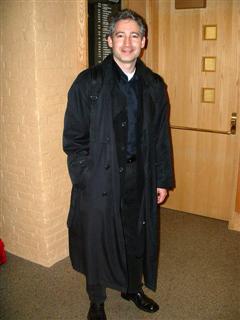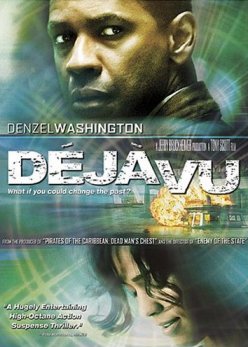|
Quantum
Physics Just Strings Us Along
An Interview with Brian Greene, Consultant
on Déjà
Vu...
|
|
|
That's
it. He's a man in black.
|
Okay.
The studio gave us this one, but it was hard for me to pass
up -- a chance to talk quantum physics on Fanboy Planet?
Ordinarily, I couldn't even begin.
But
Brian Greene, a professor of Physics and Mathematics at
Columbia University in New York, probably can't stop. He
schooled Tony Scott and Jerry Bruckheimer on how to make
the unbelievable in the film Déjà Vu somewhat
more believable.
So
sit down here and bend your mind a bit, okay? Brian will
explain it all to us, as well as the wormhole known as Hollywood.
Apparently, you can catch him onscreen in The Last Mimzy,
too...
FBP:
You work in the field of quantum mechanics and String Theory.
Do they have anything to do with string?
Brian
Greene: Quantum mechanics is the body of physical
laws describing things that are very small, like atoms and
molecules and so forth. And String Theory tries to go yet
smaller and describe the basic entities that make up everything.
The theory suggests that the basic entities are tiny vibrating
filaments that look like tiny pieces of string. That’s
where the string comes in.
FBP:
So how does this connect with the possibility of
time travel and Déjà Vu?
Brian
Greene: There’s a theory that crops up in
Déjà Vu concerning the possibility
of the existence of parallel universes and one of the ideas
that comes out of quantum mechanics is that what we see
around us is but one of many universes and that there are
many universes alongside ours and that in those universes
we may or may not exist.
FBP:
The million-dollar question is whether time travel is possible.
Will we ever go back to the future or vice versa?
Brian
Greene: You need to break that question into two
pieces. Time travel to the future is one sort. Time travel
to the past is the other sort. Time travel to the future
is completely within the laws of physics as we understand
them. In principal, if you want to know what the earth will
look like ten thousand years from now, then Einstein laid
out a blueprint of how you would accomplish that: you build
a spaceship, you travel near the speed of light for a certain
period of time, you come back, and when you step out of
your spaceship you will be just a year older, but earth
will be ten thousand or a hundred thousand years older and
you’ll have jumped into the future.
Building
that ship is something we can’t do as yet but in terms
of physics it’s perfectly within what we understand.
FBP:
And travel to the past?
Brian
Greene: That’s a much more thorny issue.
Traveling at the speed of light wouldn’t help you.
You’d have to make use of wormholes, which is what
happens in Déjà Vu. It’s conceivable
that if you manipulate the openings of wormholes adequately
it would not only be a short cut from one point in space
to another but from one point in time to another. That’s
the idea of the film.
|
|
|
We admit
it. We've got product to sell here, people.
|
FBP:
How did you become involved with Déjà
Vu?
Brian
Greene: I got a call from Bruckheimer Films saying
they had seen a television series I did called The Elegant
Universe, which is based on a book I wrote, and that
was an attempt to bring some pretty complicated ideas about
String Theory and quantum mechanics to a general audience.
So the
idea was for me to meet with them and explain some of the
physics they needed regarding wormholes and relativity in
a way that they and Tony Scott and the writers would understand.
So I went out and stood in front of a blackboard and explained
relativity to Jerry Bruckheimer, Tony Scott, the writers
and various other people connected to the film.
FBP:
Was there a test at the end and who was top of the class?
Brian
Greene: They were all very smart and it impressed
me that they knew that they were dealing with cutting edge
ideas and they wanted to stay as close to the truth as they
could. I think the philosophy of everybody in the room was
that they were going to have to break the rules because
ultimately they were making an entertainment, but they didn’t
want to just randomly make things up. And I think that was
great. So the film bends some of the rules of physics but
not in a way that’s ludicrous.
FBP:
Did you meet any of the actors?
Brian
Greene: I spoke quite a few times to Adam Goldberg,
who plays one of the team of scientists working with Denzel
Washington. A film crew also came to my classroom and filmed
me for an hour at the blackboard explaining things. The
idea was to give Adam and some of the other cast members
a model of how a scientist talks about things, and I thought
he did a great job in the film.
FBP:
Did you see yourself in his performance?
Brian
Greene: He didn’t base his performance on
me in any way, shape or form but certainly the way I try
to explain wormholes in terms of bending paper and connecting
the corners, that’s there in the film and it was fun
to see that that made it in.
FBP:
Most Hollywood films portray scientists as a bit
batty. Was it nice to see something different or are real
scientists batty anyway?
Brian
Greene: There are many examples of the wild-eyed
scientist in movies and sometimes its suitable to the comedy
– Back to the Future for example. But there
have been several attempts more recently at realistic portrayals
of scientists. Contact with Jodie (Foster) was
pretty good and I enjoyed it a lot. I liked Memento
very much – I’m not sure whether you would call
it science, but I thought it was a wonderful exploration
of time and the mind. I liked Sliding Doors, which
was about parallel universes in a way, and I loved Eternal
Sunshine of the Spotless Mind. Many of the things in
Star Trek are way beyond what we can imagine, but
I’m a huge fan of Star Trek, though I don’t
wear pointy ears or anything.
FBP:
So is Hollywood good for science?
Brian
Greene: I think it’s very positive. A film
like Déjà Vu, even if it’s
not completely scientifically based, it gets people to think
about issues of time and time travel and some of the paradoxes
of the universe and I think that makes them more receptive
to the real science.
FBP:
Is it important for ordinary folk to understand
things like String Theory?
Brian
Greene: The critical issues that we face as a world
community, from global warming to stem cells, to genetic
modification, to nuclear proliferation, to pandemics will
all have to be confronted by science and a better-informed
public can make better decisions. But what really fires
me up is that science is wonderfully enriching and exciting.
I think it’s a great loss when people don’t
know about it because they find it intimidating.
FBP:
If you could travel into the future where would
you go and what do you think the world would be like?
Brian
Greene: I don’t think we can predict what
things will be like, which is what would make it so exciting.
Even a hundred years from now, who knows? Because when you
look back to the 1920s, you realize that if you had asked
any of the people who were at the forefront of quantum mechanics
what will this be good for, I don’t think they would
have been able to predict that it would yield your cell
phone and your computer and all manner of medical technology.
Without quantum mechanics none of that would be here.
Order
Deja Vu from Amazon now!
|







